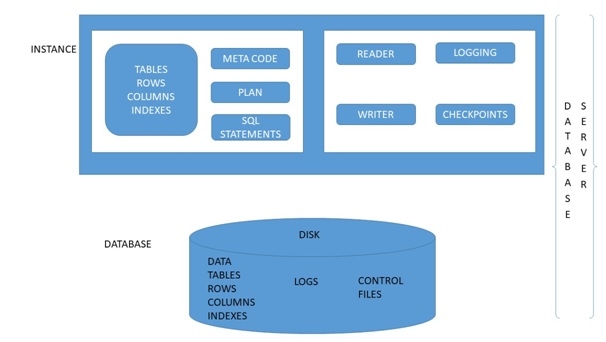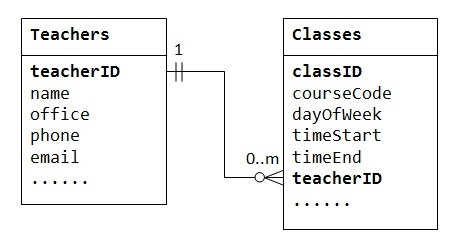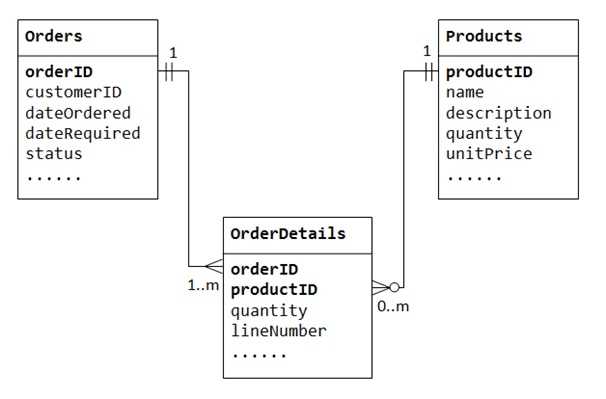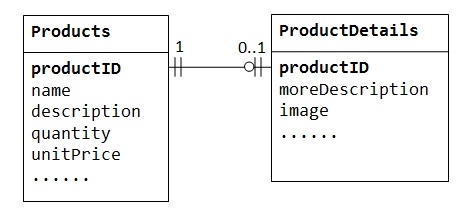
 Data Structure
Data Structure Networking
Networking RDBMS
RDBMS Operating System
Operating System Java
Java MS Excel
MS Excel iOS
iOS HTML
HTML CSS
CSS Android
Android Python
Python C Programming
C Programming C++
C++ C#
C# MongoDB
MongoDB MySQL
MySQL Javascript
Javascript PHP
PHP
- Selected Reading
- UPSC IAS Exams Notes
- Developer's Best Practices
- Questions and Answers
- Effective Resume Writing
- HR Interview Questions
- Computer Glossary
- Who is Who
Relational Database Management System (RDBMS)
Relational database design (RDD) models’ information and data into a set of tables with rows and columns. Each row of a relation/table represents a record, and each column represents an attribute of data. The Structured Query Language (SQL) is used to manipulate relational databases. The design of a relational database is composed of four stages, where the data are modeled into a set of related tables. The stages are −
- Define relations/attributes
- Define primary keys
- Define relationships
- Normalization
Relational databases differ from other databases in their approach to organizing data and performing transactions. In an RDD, the data are organized into tables and all types of data access are carried out via controlled transactions. Relational database design satisfies the ACID (atomicity, consistency, integrity, and durability) properties required from a database design. Relational database design mandates the use of a database server in applications for dealing with data management problems.

Relational Database Design Process
Database design is more art than science, as you have to make many decisions. Databases are usually customized to suit a particular application. No two customized applications are alike, and hence, no two databases are alike. Guidelines (usually in terms of what not to do instead of what to do) are provided in making these design decision, but the choices ultimately rest on the designer.
Step 1 − Define the Purpose of the Database (Requirement Analysis)
- Gather the requirements and define the objective of your database.
- Drafting out the sample input forms, queries and reports often help.
Step 2 − Gather Data, Organize in tables and Specify the Primary Keys
- Once you have decided on the purpose of the database, gather the data that are needed to be stored in the database. Divide the data into subject-based tables.
- Choose one column (or a few columns) as the so-called primary key, which uniquely identifies the each of the rows.
Step 3 − Create Relationships among Tables
A database consisting of independent and unrelated tables serves little purpose (you may consider using a spreadsheet instead). The power of a relational database lies in the relationship that can be defined between tables. The most crucial aspect in designing a relational database is to identify the relationships among tables. The types of relationship include:
- one-to-many
- many-to-many
- one-to-one
One-to-Many
In a "class roster" database, a teacher may teach zero or more classes, while a class is taught by one (and only one) teacher. In a "company" database, a manager manages zero or more employees, while an employee is managed by one (and only one) manager. In a "product sales" database, a customer may place many orders; while an order is placed by one particular customer. This kind of relationship is known as one-to-many.
The one-to-many relationship cannot be represented in a single table. For example, in a "class roster" database, we may begin with a table called Teachers, which stores information about teachers (such as name, office, phone, and email). To store the classes taught by each teacher, we could create columns class1, class2, class3, but faces a problem immediately on how many columns to create. On the other hand, if we begin with a table called Classes, which stores information about a class, we could create additional columns to store information about the (one) teacher (such as name, office, phone, and email). However, since a teacher may teach many classes, its data would be duplicated in many rows in table Classes.
To support a one-to-many relationship, we need to design two tables: for e.g. a table Classes to store information about the classes with classID as the primary key; and a table Teachers to store information about teachers with teacherID as the primary key. We can then create the one-to-many relationship by storing the primary key of the table Teacher (i.e., teacherID) (the "one"-end or the parent table) in the table classes (the "many"-end or the child table), as illustrated below.
 The column teacherID in the child table Classes is known as the foreign key. A foreign key of a child table is a primary key of a parent table, used to reference the parent table.
The column teacherID in the child table Classes is known as the foreign key. A foreign key of a child table is a primary key of a parent table, used to reference the parent table.
Many-to-Many
In a "product sales" database, a customer's order may contain one or more products; and a product can appear in many orders. In a "bookstore" database, a book is written by one or more authors; while an author may write zero or more books. This kind of relationship is known as many-to-many.
Let's illustrate with a "product sales" database. We begin with two tables: Products and Orders. The table products contain information about the products (such as name, description and quantityInStock) with productID as its primary key. The table orders contain customer's orders (customerID, dateOrdered, dateRequired and status). Again, we cannot store the items ordered inside the Orders table, as we do not know how many columns to reserve for the items. We also cannot store the order information in the Products table.
To support many-to-many relationship, we need to create a third table (known as a junction table), say OrderDetails (or OrderLines), where each row represents an item of a particular order. For the OrderDetails table, the primary key consists of two columns: orderID and productID, that uniquely identify each row. The columns orderID and productID in OrderDetails table are used to reference Orders and Products tables, hence, they are also the foreign keys in the OrderDetails table.

The many-to-many relationship is, in fact, implemented as two one-to-many relationships, with the introduction of the junction table.
An order has many items in OrderDetails. An OrderDetails item belongs to one particular order.
A product may appear in many OrderDetails. Each OrderDetails item specified one product.
One-to-One
In a "product sales" database, a product may have optional supplementary information such as image, more description and comment. Keeping them inside the Products table results in many empty spaces (in those records without these optional data). Furthermore, these large data may degrade the performance of the database.
Instead, we can create another table (say ProductDetails, ProductLines or ProductExtras) to store the optional data. A record will only be created for those products with optional data. The two tables, Products and ProductDetails, exhibit a one-to-one relationship. That is, for every row in the parent table, there is at most one row (possibly zero) in the child table. The same column productID should be used as the primary key for both tables.
Some databases limit the number of columns that can be created inside a table. You could use a one-to-one relationship to split the data into two tables. A one-to-one relationship is also useful for storing certain sensitive data in a secure table, while the non-sensitive ones in the main table.

Column Data Types
You need to choose an appropriate data type for each column. Commonly data types include integers, floating-point numbers, string (or text), date/time, binary, collection (such as enumeration and set).
Step 4 − Refine & Normalize the Design
For example,
- adding more columns,
- create a new table for optional data using one-to-one relationship,
- split a large table into two smaller tables,
- Other methods.
Normalization
Apply the so-called normalization rules to check whether your database is structurally correct and optimal.
First Normal Form (1NF): A table is 1NF if every cell contains a single value, not a list of values. This property is known as atomic. 1NF also prohibits a repeating group of columns such as item1, item2, itemN. Instead, you should create another table using a one-to-many relationship.
Second Normal Form (2NF) − A table is 2NF if it is 1NF and every non-key column is fully dependent on the primary key. Furthermore, if the primary key is made up of several columns, every non-key column shall depend on the entire set and not part of it.
For example, the primary key of the OrderDetails table comprising orderID and productID. If unitPrice is dependent only on productID, it shall not be kept in the OrderDetails table (but in the Products table). On the other hand, if the unit price is dependent on the product as well as the particular order, then it shall be kept in the OrderDetails table.
Third Normal Form (3NF) − A table is 3NF if it is 2NF and the non-key columns are independent of each other. In other words, the non-key columns are dependent on primary key, only on the primary key and nothing else. For example, suppose that we have a Products table with columns productID (primary key), name and unitPrice. The column discountRate shall not belong to the Products table if it is also dependent on the unitPrice, which is not part of the primary key.
Higher Normal Form: 3NF has its inadequacies, which leads to a higher Normal form, such as Boyce/Codd Normal form, Fourth Normal Form (4NF) and Fifth Normal Form (5NF), which is beyond the scope of this tutorial.
At times, you may decide to break some of the normalization rules, for performance reason (e.g., create a column called totalPrice in Orders table which can be derived from the orderDetails records); or because the end-user requested for it. Make sure that you fully aware of it, develop programming logic to handle it, and properly document the decision.
Integrity Rules
You should also apply the integrity rules to check the integrity of your design −
1. Entity Integrity Rule − The primary key cannot contain NULL. Otherwise, it cannot uniquely identify the row. For composite key made up of several columns, none of the columns can contain NULL. Most of the RDBMS check and enforce this rule.
2.Referential Integrity Rule − Each foreign key value must be matched to a primary key value in the table referenced (or parent table).
You can insert a row with a foreign key in the child table only if the value exists in the parent table.
If the value of the key changes in the parent table (e.g., the row updated or deleted), all rows with this foreign key in the child table(s) must be handled accordingly. You could either (a) disallow the changes; (b) cascade the change (or delete the records) in the child tables accordingly; (c) set the key value in the child tables to NULL.
Most RDBMS can be set up to perform the check and ensure the referential integrity, in a specified manner.
3.Business logic Integrity − Besides the above two general integrity rules, there could be integrity (validation) pertaining to the business logic, e.g., zip code shall be 5-digit within a certain ranges, delivery date and time shall fall in the business hours; quantity ordered shall be equal or less than quantity in stock, etc. These could be carried out invalidation rule (for the specific column) or programming logic.
Column Indexing
You could create an index on the selected column(s) to facilitate data searching and retrieval. An index is a structured file that speeds up data access for SELECT but may slow down INSERT, UPDATE, and DELETE. Without an index structure, to process a SELECT query with a matching criterion (e.g., SELECT * FROM Customers WHERE name='Tan Ah Teck'), the database engine needs to compare every record in the table. A specialized index (e.g., in BTREE structure) could reach the record without comparing every record. However, the index needs to be rebuilt whenever a record is changed, which results in overhead associated with using indexes.
The index can be defined on a single column, a set of columns (called concatenated index), or part of a column (e.g., first 10 characters of a VARCHAR(100)) (called partial index). You could build more than one index in a table. For example, if you often search for a customer using either customerName or phone number, you could speed up the search by building an index on column customerName, as well as phoneNumber. Most RDBMS builds an index on the primary key automatically.

